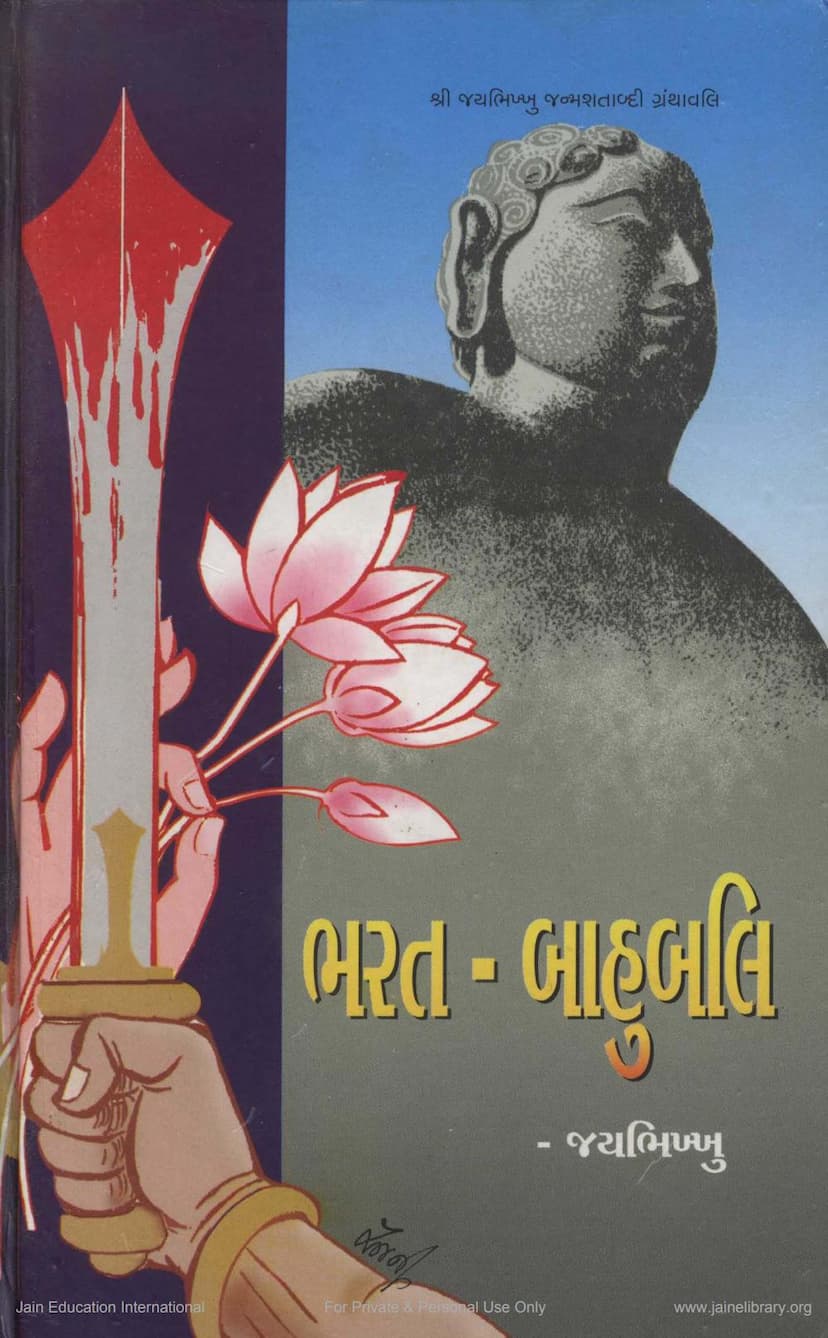Bharat Bahubali
Added to library: September 1, 2025

Summary
Here's a comprehensive summary of the Jain text "Bharat Bahubali" by Jaybhikkhu, based on the provided pages:
Book Title: Bharat Bahubali Author: Jaybhikkhu Publisher: Shri Jaybhikkhu Sahitya Trust, Ahmedabad
This novel, "Bharat Bahubali," is presented as a continuation of the narratives in "Bhagwan Rishabhdev" and "Chakravarti Bharatdev." It delves into the story of Chakravarti Bharatdev and his brother Bahubali (known for the Gommateshwara statue), exploring themes of love, devotion, enmity, war, and ultimately, self-surrender and renunciation.
Key Themes and Narrative Elements:
- The Conflict and Its Roots: The story begins with the grand entry of Chakravarti Bharatdev into Ayodhya after conquering the nine divisions of the earth. His immense wealth and power are described, along with the joyous reception by his people. However, Bharat's mind is preoccupied with a hidden longing.
- Bharat's Inner Turmoil: Bharat's thoughts drift to "Sundari," a woman from his past, whom he deeply loves. His contemplation reveals a forbidden love for his brother's sister, and a struggle between societal norms (which previously permitted cousin marriage but were revolutionized by their father, Lord Rishabhdev) and his deep affection. He had sought an exemption from his father but was met with silence. Despite trying to suppress his feelings, Sundari remained his life's aspiration.
- The Invention of the Mirror: The narrative introduces the invention of the mirror ("Darpan" or "Ariso") by a vidhyadhar (celestial architect). This invention becomes a catalyst for revealing inner truths and desires.
- Sundari's Renunciation: Bharat's longing for Sundari is intensified when he encounters her in a changed, austere state. She reveals her decision to renounce worldly life and dedicate herself to propagating their father's teachings. She explains that true greatness lies not in worldly conquest but in self-conquest. Her philosophical outlook and her commitment to a higher purpose leave Bharat and his chief queen, Subhadra, in awe.
- Subhadra's Jealousy and Ambition: Queen Subhadra, initially proud of her own beauty and status as Bharat's wife, becomes intensely jealous of Sundari. She vows to overcome this rival, even if it means resorting to extreme measures. This jealousy fuels her manipulative nature, seen in her interactions with the mirror inventor and her attempts to provoke Bharat.
- The Brothers' Different Paths: The novel highlights the contrasting philosophies of Bharat and Bahubali. Bharat is portrayed as a worldly conqueror, driven by power and empire-building, albeit with a sense of duty. Bahubali, on the other hand, embodies detachment, spiritual pursuit, and inner peace, renouncing worldly possessions and kingdom for a life of asceticism.
- The Role of Teachings: The text emphasizes the teachings of Lord Rishabhdev, particularly his revolutionary ideas about societal structure, marriage, and the pursuit of dharma. Bahubali embodies these teachings, seeking spiritual liberation.
- The Significance of the Mirror: The mirror serves as a symbolic device, reflecting not just physical beauty but also inner states and truths. It prompts introspection and self-awareness in the characters.
- The Unfolding of Destiny: The narrative follows Bharat's internal struggle and his eventual realization about the true meaning of strength and conquest. It also depicts the societal impact of these ideals, showing how even in a seemingly utopian land, human emotions like jealousy and ambition play a role.
- The Story Continues: The text suggests that the narrative of Bharat and Bahubali continues, exploring their differing paths and their profound impact on the world.
Jaybhikkhu's Literary Style:
The summary also touches upon Jaybhikkhu's writing style, describing him as a "life-affirming litterateur" who infused his works with values of humanism, patriotism, respect for women, and religious tolerance. His writing is characterized by its clarity, vivid descriptions, and ability to appeal to readers of all ages. The novel is noted for its blend of historical elements with profound philosophical and spiritual insights.
Overall, "Bharat Bahubali" is presented as a narrative that explores the human condition through the lens of Jain philosophy, emphasizing the eternal struggle between worldly desires and spiritual aspirations, and the ultimate victory of self-realization and detachment.